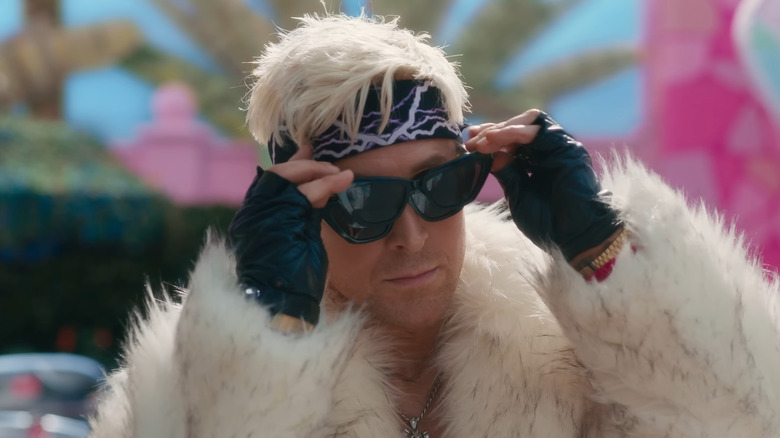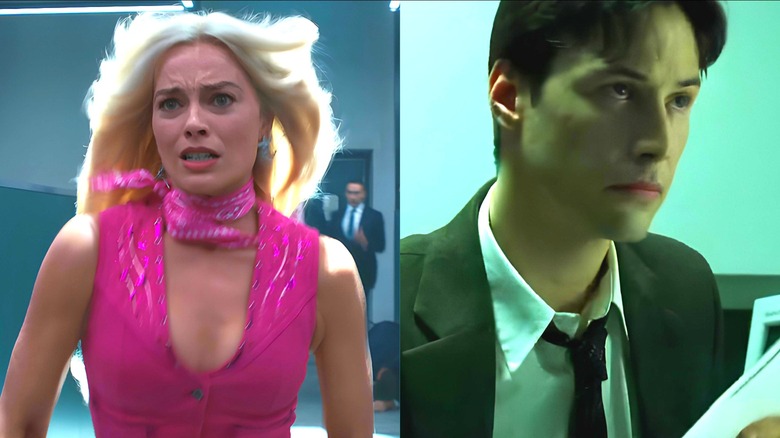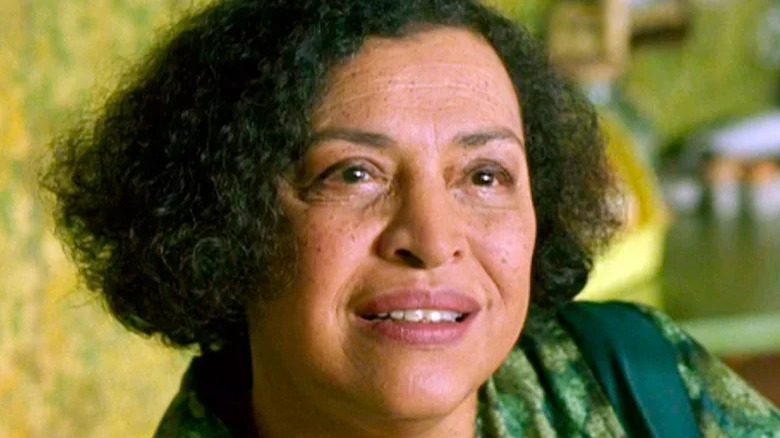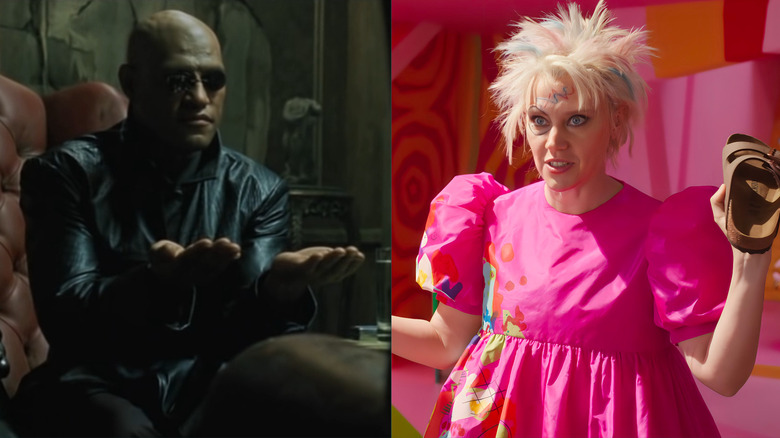Barbie's Wild Nods To The Matrix Movies Explained
Contains spoilers for "Barbie"
Regarding films to compare "Barbie" to, plenty of choices could get lost in the packaging with Greta Gerwig's IP-based entry that feels almost OP. That being said, there's one correlation to be made that we probably wouldn't have expected: "Barbie" ends up mirroring one of the greatest science fiction films ever made. Somehow, in the perpetually pink-tinted film hitting theaters this week, Barbie (Margot Robbie) heads down a rabbit hole that has often been imitated but never duplicated as well as it is here in the iconic doll's big screen outing — and she doesn't need to dodge a single bullet to do so.
During Barbie's initial trip to the Real World, she's snatched up by Mattel and taken to their head office for a chat with the CEO (Will Ferrell). What's funny is that in its execution and the other conversations Barbie has, the film evokes a strong case of deja vu for the Wachowskis' beloved and groundbreaking sci-fi action movie, "The Matrix." Both center on characters starting to see cracks in the illusion of their respective worlds. Barbie and Neo (Keanu Reeves) bust out, only to learn that reality is far bleaker than they'd been led to believe. Sure, Barbie might not do as much kung-fu as The One in her breakout blockbuster entry, but it certainly homes a soul-sucking workplace that mirrors the one Mr. Anderson had in 1999.
Barbie's break from Mattel repeats a critical Matrix Reloaded moment
Besides being soaked in one specific color, just like Neo's green-tinted rage against the machine, Barbie's pink-hued odyssey finds her facing off with an army of suit-wearing drones, just like Neo. Certainly lighter in its execution, it's during her escape from the Mattel CEO that bullet-time is replaced with Barbie-time as she finds herself sprinting around an office floor trying to evade her captors. For "The Matrix" fans, it'll spark flashes of Neo's bust from his office job with the almost identical faceless cubicles that Stereotypical Barbie is seen briefly sprinting around.
The echoes of the dark future fable don't stop there, though, because just as Barbie manages to evade her captors from the woeful workplace, she finds herself in a lengthy hallway filled with numberless doors. It's a shot straight out of "The Matrix Reloaded," delivering the same visuals as a hidden portal traveled by The Keymaker (Randall Duk Kim). The difference is that Barbie picks a door by chance, leading her to a location resembling an iconic "The Matrix" spot that homed a figure as ethereal as the one we meet in "Barbie" — one that has nothing but pearls of wisdom regarding the world they made. In the case of "The Matrix," it's The Oracle. With "Barbie," it's a charming little lady named Ruth.
Barbie has her own Oracle just like Neo
After opening the unmarked door to escape the Mattel stooges, Barbie stumbles into what initially looks like a sound stage homing a kitchen from the 1960s. She sits down with a woman named Ruth (Rhea Perlman), who we later learn to be the creator of Barbie, Ruth Handler. While it's a calming conversation in its own right, it's another instance that Gerwig's brilliant Barbie outing shares traits similar to the Wachowskis' game-changing sci-fi classic. Perlman's take on Ruth Handler is almost angelic, in a moment that ultimately feels out of space and time, just like Neo's first encounter with The Oracle (played initially by Gloria Foster). Barbie and Ruth's conversation is even thought-provoking, similar to Neo's talk with The Oracle.
Both scenes pump the brakes in their respective films, otherwise rife with energy, and serve as a compelling interaction. The same can be said for when Ruth and Barbie have their quiet one-to-one near the film's end. It's reminiscent of when Neo and The Oracle have a chat at the train station in "The Matrix Revolutions," where Neo, just like Barbie, has to make an important choice that will forever change his trajectory. It's just one with less beer brewskis and much more bullet dodging.
Barbie has an identity issue, just like The Matrix did
While Gerwig might cut her engrossing story down to one movie and swap gun-fu for a Ken-fuelled final act, both "Barbie" and the first three "Matrix" films provide an essential focus on identity and the battle to find one on our own. The crux of the issue is right there in the name of Margot Robbie's out-the-box alter-ego. Stereotypical Barbie might be the center of attention, but she spends the film fighting to claim her path, even though she doesn't know what that looks like. Heck, even her red pill moment is replaced with Birkenstock's. It's a beautiful and understandably scary realization that comes to light when she takes Ruth's hand, finds herself bathed in white light, and heads off into The Real World, albeit ending on a comedic and perfectly applied punchline.
This journey is her trip down the rabbit hole, similar to the one Mr. Anderson took in becoming Neo. It has long since been confirmed the initial "Matrix" film was an allegory for the gender transition process; Neo moved on from the restraint that held him back so he could fulfill his destiny. What's great is that both films have valuable statements to make in brilliant and similar ways, and "Barbie" could, as a result, go on to hold just as much importance as "The Matrix" did and still does.



